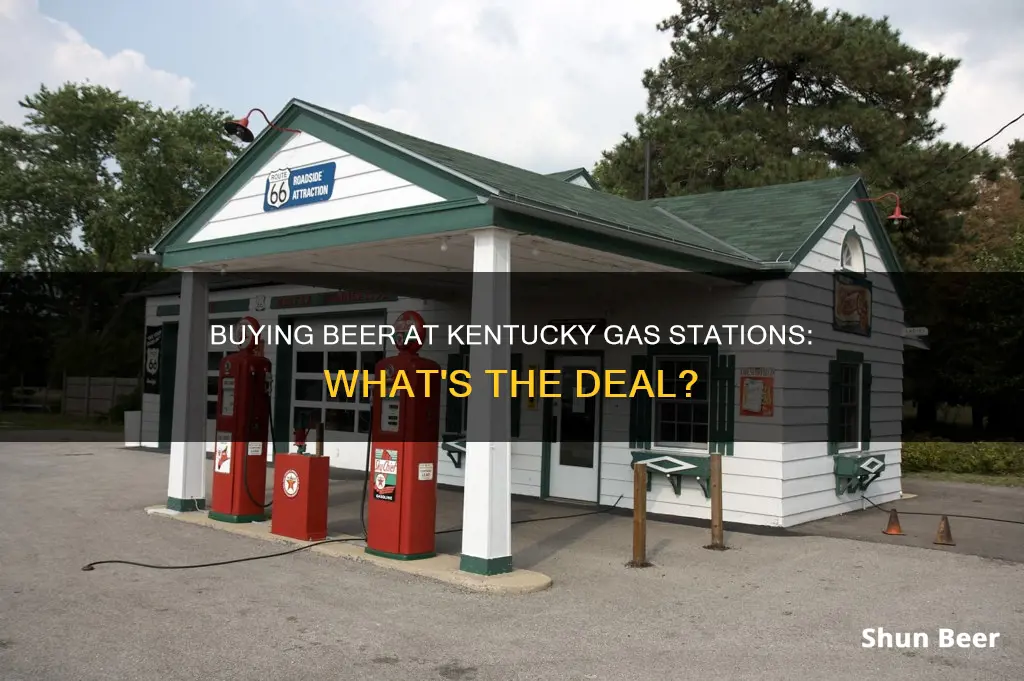
Kentucky has a complex set of laws governing the sale of alcoholic beverages, with wet, moist, and dry counties, and varying rules for different types of retailers. So, can you buy beer at a gas station in Kentucky? The answer is yes, but only beer. Some counties also allow gas stations to sell wine, but spirits are not permitted. Kentucky's alcohol laws have been described as a maze of obscure statutory language and the state is working to simplify them.
| Characteristics | Values |
|---|---|
| Can you buy beer at gas stations in Kentucky? | Yes |
| Can you buy wine at gas stations in Kentucky? | No, but some counties allow it |
| Can you buy liquor at gas stations in Kentucky? | No |
| Can you buy beer in Kentucky on Sundays? | Yes, from 1 pm until 9 pm |
| Can you buy beer in Kentucky on the Fourth of July? | Yes |
What You'll Learn

Kentucky's alcohol laws are confusing and differ by county
In terms of what is sold where, Kentucky's laws are equally complex. Beer can be sold in grocery stores and gas stations, but only in gas stations that are not located in dry counties. In Kentucky locations where alcohol sales are allowed, beer—but not wine or spirits—may be sold in grocery stores. Grocery stores may obtain a license to sell wine and spirits if they provide a separate entrance to that part of the store, where minors are not allowed to work. A store employee of legal age is required to conduct beer sales. In drugstores, however, there is no such requirement for a separate entrance.
Kentucky has over 70 types of licenses for the sale of alcohol, including four types of restaurant licenses, and the state has issued more than 13,000 licenses. A consumer may carry a running tab at a bar to buy beer but not for distilled spirits or wine. Voters cannot buy alcoholic beverages during primary or general elections but can during special elections.
The complexity of Kentucky's alcohol laws is a result of politics. The issue of alcohol sales has divided Kentucky and the nation for years, and local option election laws arose because some communities wanted alcohol sales while others did not. As a result, the alcoholic beverage control laws are a patchwork of sometimes conflicting provisions.
Friends, Beers, and Baseball: Can They Mix?
You may want to see also

Kentucky has wet, moist, and dry counties
In the state of Kentucky, there are varying regulations on the sale of alcohol. Kentucky has wet, moist, and dry counties, each with different rules regarding the sale of alcoholic beverages.
A "wet county" is one where alcohol is sold without any special restrictions. In these counties, alcoholic beverages can be purchased at licensed liquor stores, restaurants, bars, clubs, hotels, breweries, wineries, and even gas stations. Wet counties in Kentucky include Arkansas, Boone, and Crittenden, among others.
On the other hand, a "dry county" is one in which the sale of alcoholic beverages is prohibited entirely. There are currently 11 dry counties in Kentucky, including Ashley, Bradley, and Clay. In these counties, you cannot purchase alcohol at all, regardless of the type of establishment.
Finally, a "moist county" falls somewhere between a wet and a dry county. In these counties, alcohol can be sold in certain situations, but there are limitations that a normal wet county would not have. For example, a moist county may only allow alcohol sales in restaurants that make at least 70% of their revenue from food sales and have a minimum number of seats. Oldham County in Kentucky is an example of a moist county.
The regulations in Kentucky's wet, moist, and dry counties can vary significantly, and it's important to be aware of the local laws before purchasing or consuming alcohol. These laws can have a significant impact on businesses and consumers, and some historically dry counties have switched to the moist system to avoid losing revenue to businesses in other counties.
It's worth noting that, regardless of the county type, Kentucky has strict alcohol laws. For example, the legal drinking age in Kentucky is 21, and the state has an open container law that requires any previously opened alcohol containers to be stored in the trunk of a car. Additionally, Kentucky gas stations are generally only allowed to sell beer, although some counties may also permit the sale of wine at gas stations.
Buying Beer in Michigan: Gas Station Laws
You may want to see also

Beer can be sold in gas stations in Kentucky
In Kentucky, beer can be sold in gas stations, grocery stores, and retailers. However, grocery stores are only allowed to sell beer and not wine or spirits unless they have a separate entrance and shop to sell wine or liquor, where minors are not allowed to work. In addition, the person selling the beer must be of legal age.
Kentucky has wet, moist, and dry counties, and the sale of alcohol is prohibited in dry counties. In moist counties, there may be wet cities where the sale of alcohol is permitted. Some counties also allow gas stations to sell both beer and wine.
The hours during which alcohol can be sold also vary. In Kentucky, alcohol can be sold from 6 am to 4 am Monday to Saturday and from 1 pm to 4 am on Sunday.
The laws regarding alcohol sales in Kentucky have been described as confusing and piecemeal, with more than 70 types of licenses for the sale of alcohol. There have been efforts to modernize and streamline these laws, but as of 2024, the regulations remain complex.
Idaho Beer Laws: When Can You Buy?
You may want to see also

Kentucky has over 70 types of alcohol sales licenses
Kentucky has a complex system of alcohol laws, with a mix of wet, moist, and dry counties, and over 70 types of alcohol sales licenses. The state's alcohol laws have been described as a "maze of obscure statutory language" and "perplexing" by a justice of the Kentucky Supreme Court and a newspaper, respectively. The state's Department of Alcoholic Beverage Control (ABC) uses specific terminology to classify the counties, and the licensing process can be intricate.
The different types of licenses available in Kentucky reflect the varying levels of restriction on alcohol sales in different counties. For example, there are licenses for wet counties, which allow full retail sales under state license, and dry counties, which prohibit all alcohol sales. There are also licenses for moist counties, which occupy a middle ground between wet and dry, with limited sales allowed in specific cities or for on-site consumption only.
Additionally, the type of license required depends on the type of business selling alcohol. For instance, grocery stores can sell beer in the main shopping area but require a separate entrance and section for wine and spirits, which minors are not allowed to enter. Drugstores, on the other hand, can sell wine and spirits without these restrictions. Gas stations are typically limited to selling beer only, although some counties may allow them to sell wine as well.
The process of obtaining a liquor license in Kentucky can be lengthy and involves multiple steps, including filling out forms, submitting documentation, public notification, and an investigation by the ABC. The cost of a liquor license can vary, but it is a significant expense for businesses. The specific license required depends on factors such as the type of business, the number of employees, and the location.
The state's alcohol laws and licensing system aim to balance the interests of different communities and businesses while ensuring the safe and responsible sale and consumption of alcohol. However, the complexity of the system can be challenging to navigate for businesses and consumers alike.
Beer Run Buddy Blues: Can My Friend Get Caught?
You may want to see also

Alcohol sales are prohibited in Kentucky on Sundays
In Kentucky, the sale of alcohol is regulated by the Department of Alcoholic Beverage Control, which aims to simplify and modernize the state's alcohol laws. The legal drinking age in Kentucky is 21, and individuals must be over 21 to purchase alcohol. However, those who are 18 can sell beer, and individuals who are 20 can serve alcohol and bartend.
Kentucky's alcohol laws have a long history, dating back to the end of Prohibition in 1933. The state has over 70 types of licenses for the sale of alcohol, including restaurant licenses. These laws have been described as a "maze of obscure statutory language" and can be confusing for consumers and businesses.
Grocery stores in Kentucky are allowed to sell beer, but they must have a separate entrance and designated area for wine and spirits, where minors are not allowed to work. Drugstores, on the other hand, can sell wine and spirits without these restrictions. Kentucky gas stations are only permitted to sell beer.
While alcohol sales are prohibited in grocery stores on Sundays, they are allowed from 6 am to 4 am Monday to Saturday and 1 pm to 4 am on Sundays in bars and restaurants. These laws, known as \"blue laws,\" are designed to restrict or ban certain activities on Sundays for religious reasons, particularly to promote a day of worship or rest.
Kansas Beer Laws: Sunday Shopping Limits Explained
You may want to see also
Frequently asked questions
Yes, beer can be purchased at gas stations in Kentucky.
No, gas stations in Kentucky can only sell beer.
Yes, Kentucky has dry, moist, and wet counties, and alcohol sales are prohibited on Sundays.
Dry counties prohibit the sale of alcoholic beverages, wet counties permit full retail sales of alcohol under a state license, and moist counties have a wet city in a dry county.
Beer can be purchased in grocery stores in Kentucky, but wine and liquor can only be sold in licensed liquor stores. However, grocery stores may obtain a license to sell wine and liquor if they provide a separate entrance and section of the store for these products, where minors are not allowed to work.







